Business Ethics: Financial vs. Social Goals in Public Companies
VerifiedAdded on 2022/08/12
|14
|2262
|21
Essay
AI Summary
This essay critically examines whether public companies with distributed ownership can simultaneously achieve financial and social goals, drawing upon readings on financialization, agency theory, and business ethics. The essay analyzes the Volkswagen emissions scandal as a prime example, demonstrating how organizations may prioritize financial objectives and exploit ethical loopholes, often leading to fraudulent practices. It explores the conflict between corporate sovereignty and democratic business ethics, highlighting how the pursuit of financial success can undermine social responsibility. The essay also discusses the limitations of corporate ethics in preventing misconduct, and the role of external agencies in ensuring ethical behavior. The conclusion emphasizes the difficulty for companies to genuinely balance financial and social goals, suggesting that the pressure to maximize profits often compromises ethical standards and social responsibility. The essay underscores the need for external oversight to prevent corporate scandals and promote genuine ethical practices within the business world.
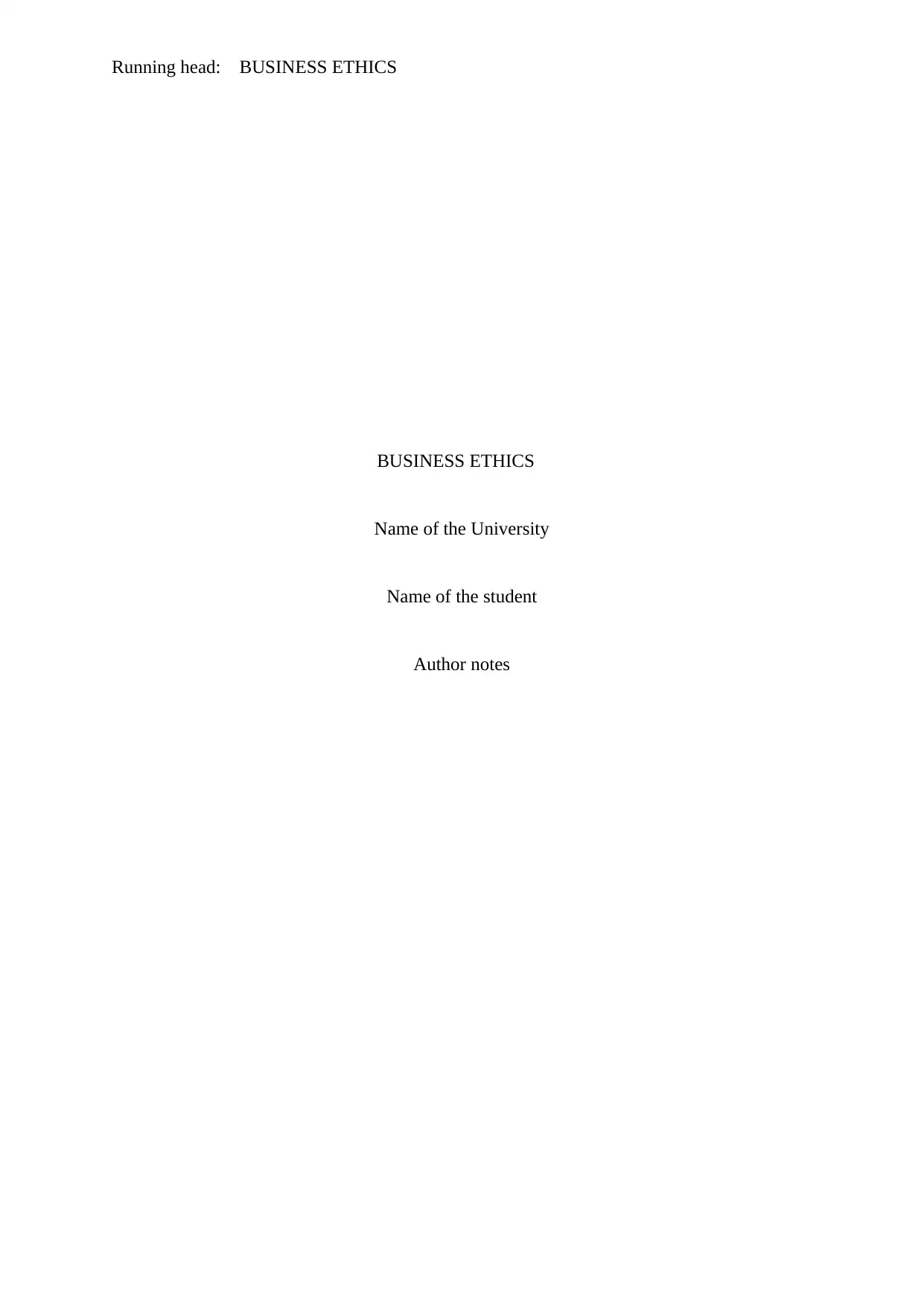
Running head: BUSINESS ETHICS
BUSINESS ETHICS
Name of the University
Name of the student
Author notes
BUSINESS ETHICS
Name of the University
Name of the student
Author notes
Paraphrase This Document
Need a fresh take? Get an instant paraphrase of this document with our AI Paraphraser
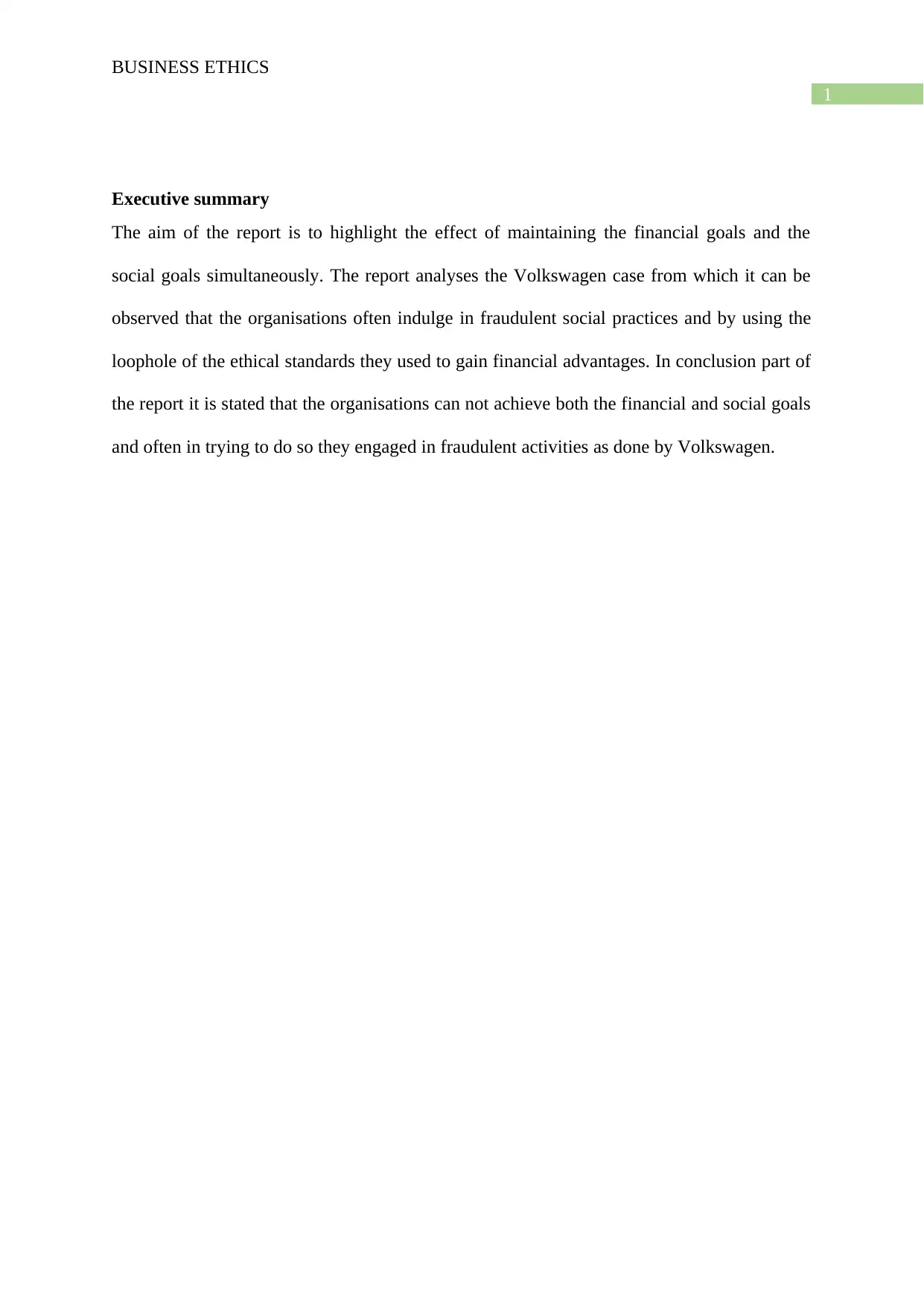
1
BUSINESS ETHICS
Executive summary
The aim of the report is to highlight the effect of maintaining the financial goals and the
social goals simultaneously. The report analyses the Volkswagen case from which it can be
observed that the organisations often indulge in fraudulent social practices and by using the
loophole of the ethical standards they used to gain financial advantages. In conclusion part of
the report it is stated that the organisations can not achieve both the financial and social goals
and often in trying to do so they engaged in fraudulent activities as done by Volkswagen.
BUSINESS ETHICS
Executive summary
The aim of the report is to highlight the effect of maintaining the financial goals and the
social goals simultaneously. The report analyses the Volkswagen case from which it can be
observed that the organisations often indulge in fraudulent social practices and by using the
loophole of the ethical standards they used to gain financial advantages. In conclusion part of
the report it is stated that the organisations can not achieve both the financial and social goals
and often in trying to do so they engaged in fraudulent activities as done by Volkswagen.
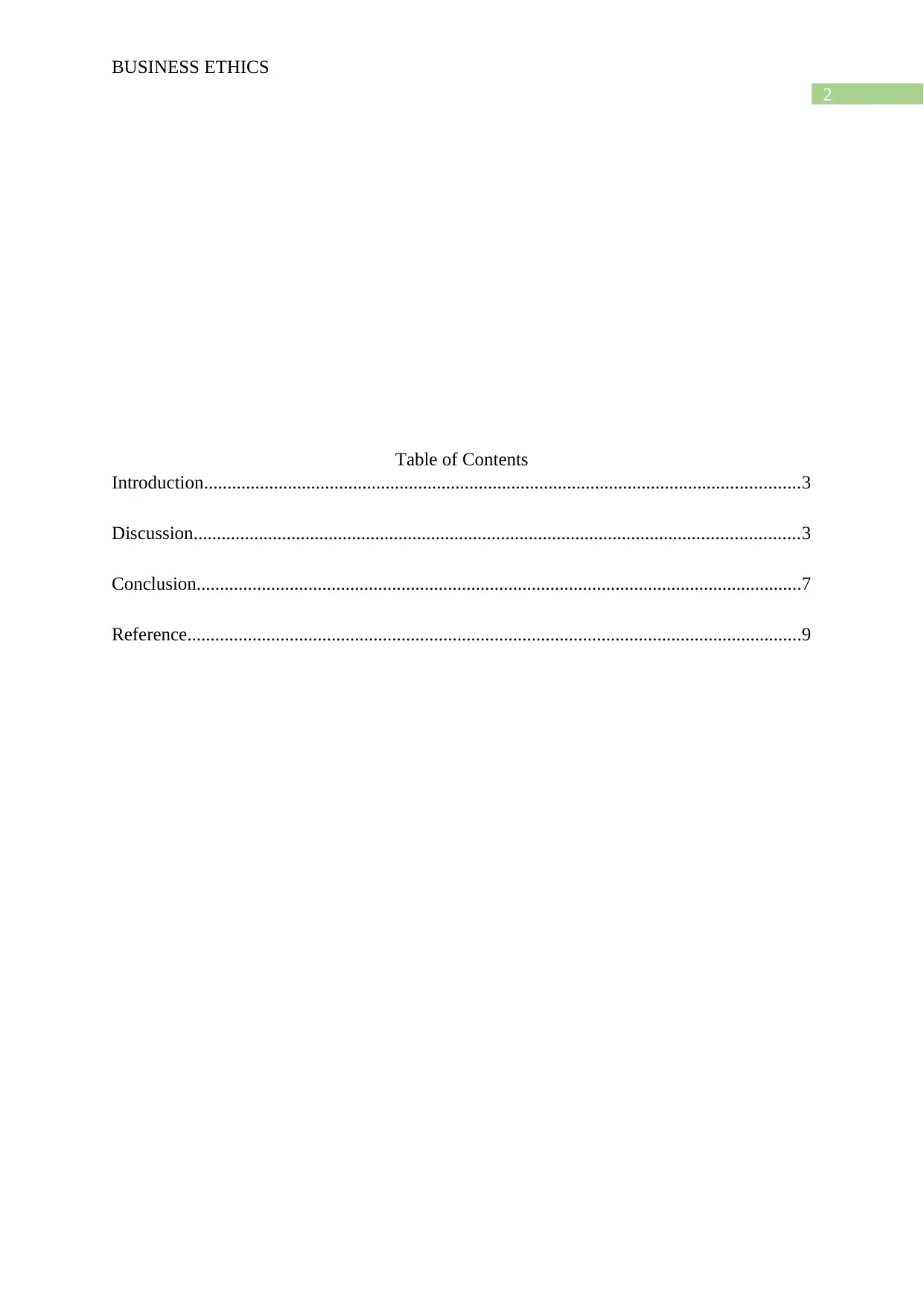
2
BUSINESS ETHICS
Table of Contents
Introduction................................................................................................................................3
Discussion..................................................................................................................................3
Conclusion..................................................................................................................................7
Reference....................................................................................................................................9
BUSINESS ETHICS
Table of Contents
Introduction................................................................................................................................3
Discussion..................................................................................................................................3
Conclusion..................................................................................................................................7
Reference....................................................................................................................................9
⊘ This is a preview!⊘
Do you want full access?
Subscribe today to unlock all pages.

Trusted by 1+ million students worldwide
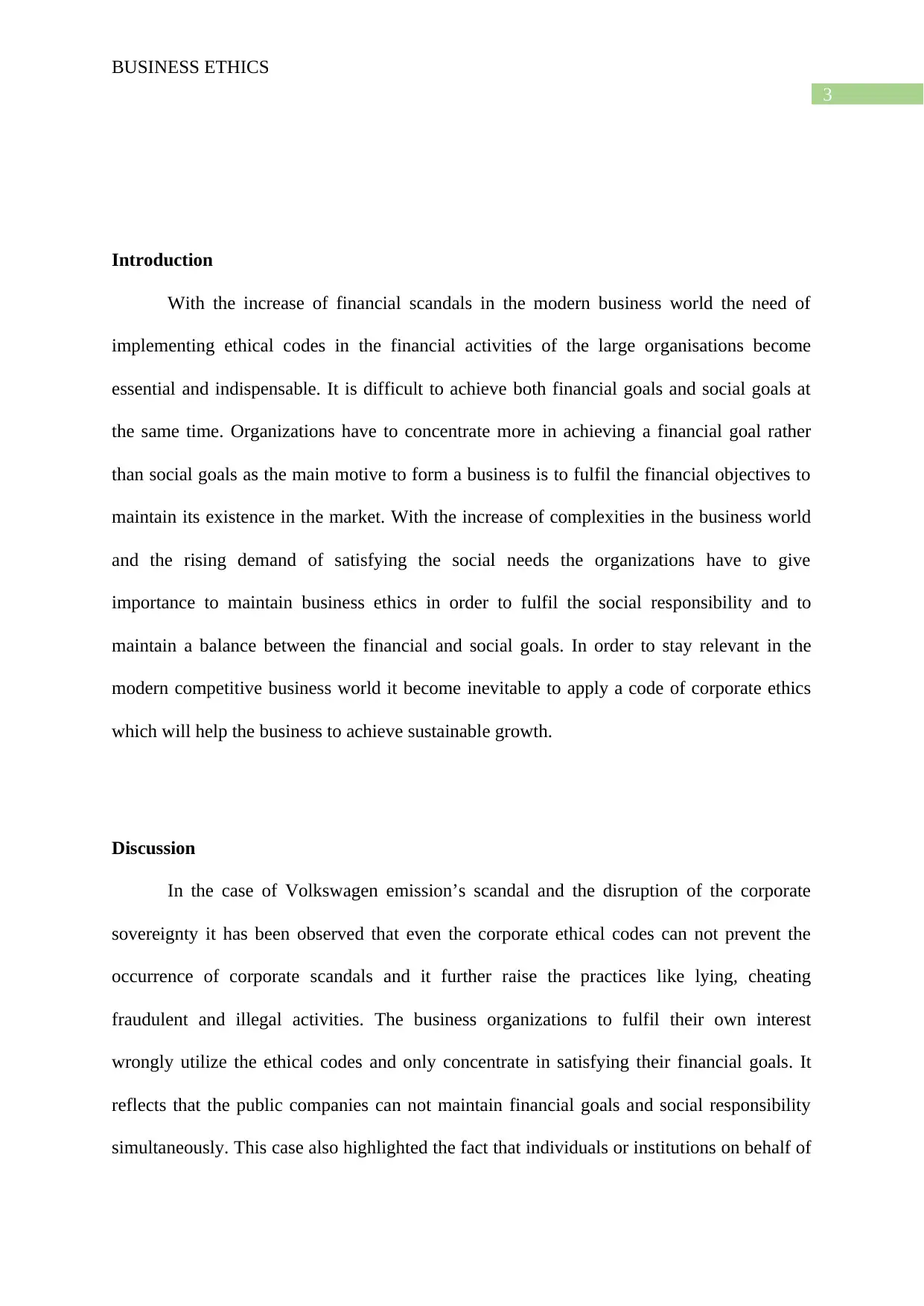
3
BUSINESS ETHICS
Introduction
With the increase of financial scandals in the modern business world the need of
implementing ethical codes in the financial activities of the large organisations become
essential and indispensable. It is difficult to achieve both financial goals and social goals at
the same time. Organizations have to concentrate more in achieving a financial goal rather
than social goals as the main motive to form a business is to fulfil the financial objectives to
maintain its existence in the market. With the increase of complexities in the business world
and the rising demand of satisfying the social needs the organizations have to give
importance to maintain business ethics in order to fulfil the social responsibility and to
maintain a balance between the financial and social goals. In order to stay relevant in the
modern competitive business world it become inevitable to apply a code of corporate ethics
which will help the business to achieve sustainable growth.
Discussion
In the case of Volkswagen emission’s scandal and the disruption of the corporate
sovereignty it has been observed that even the corporate ethical codes can not prevent the
occurrence of corporate scandals and it further raise the practices like lying, cheating
fraudulent and illegal activities. The business organizations to fulfil their own interest
wrongly utilize the ethical codes and only concentrate in satisfying their financial goals. It
reflects that the public companies can not maintain financial goals and social responsibility
simultaneously. This case also highlighted the fact that individuals or institutions on behalf of
BUSINESS ETHICS
Introduction
With the increase of financial scandals in the modern business world the need of
implementing ethical codes in the financial activities of the large organisations become
essential and indispensable. It is difficult to achieve both financial goals and social goals at
the same time. Organizations have to concentrate more in achieving a financial goal rather
than social goals as the main motive to form a business is to fulfil the financial objectives to
maintain its existence in the market. With the increase of complexities in the business world
and the rising demand of satisfying the social needs the organizations have to give
importance to maintain business ethics in order to fulfil the social responsibility and to
maintain a balance between the financial and social goals. In order to stay relevant in the
modern competitive business world it become inevitable to apply a code of corporate ethics
which will help the business to achieve sustainable growth.
Discussion
In the case of Volkswagen emission’s scandal and the disruption of the corporate
sovereignty it has been observed that even the corporate ethical codes can not prevent the
occurrence of corporate scandals and it further raise the practices like lying, cheating
fraudulent and illegal activities. The business organizations to fulfil their own interest
wrongly utilize the ethical codes and only concentrate in satisfying their financial goals. It
reflects that the public companies can not maintain financial goals and social responsibility
simultaneously. This case also highlighted the fact that individuals or institutions on behalf of
Paraphrase This Document
Need a fresh take? Get an instant paraphrase of this document with our AI Paraphraser
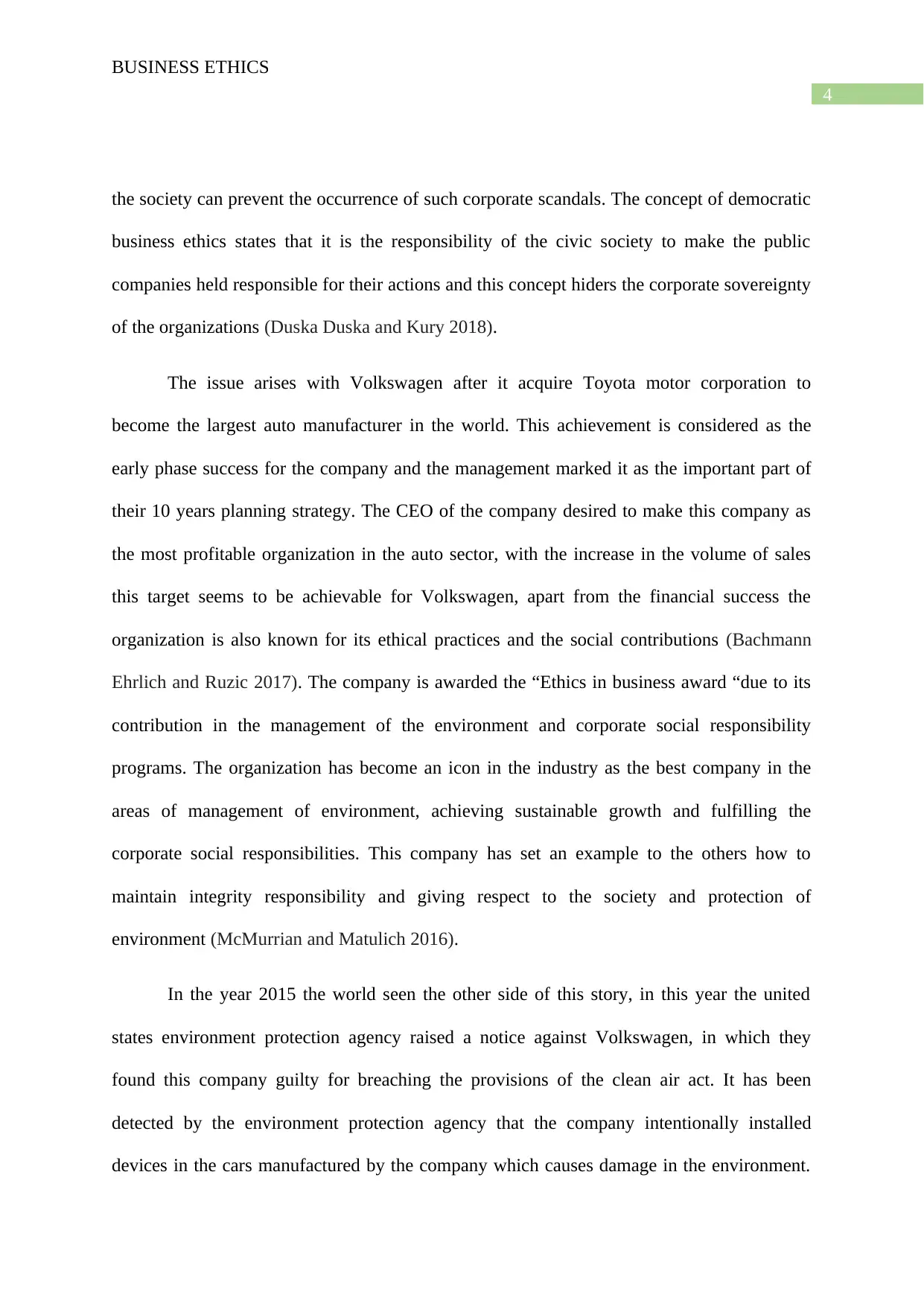
4
BUSINESS ETHICS
the society can prevent the occurrence of such corporate scandals. The concept of democratic
business ethics states that it is the responsibility of the civic society to make the public
companies held responsible for their actions and this concept hiders the corporate sovereignty
of the organizations (Duska Duska and Kury 2018).
The issue arises with Volkswagen after it acquire Toyota motor corporation to
become the largest auto manufacturer in the world. This achievement is considered as the
early phase success for the company and the management marked it as the important part of
their 10 years planning strategy. The CEO of the company desired to make this company as
the most profitable organization in the auto sector, with the increase in the volume of sales
this target seems to be achievable for Volkswagen, apart from the financial success the
organization is also known for its ethical practices and the social contributions (Bachmann
Ehrlich and Ruzic 2017). The company is awarded the “Ethics in business award “due to its
contribution in the management of the environment and corporate social responsibility
programs. The organization has become an icon in the industry as the best company in the
areas of management of environment, achieving sustainable growth and fulfilling the
corporate social responsibilities. This company has set an example to the others how to
maintain integrity responsibility and giving respect to the society and protection of
environment (McMurrian and Matulich 2016).
In the year 2015 the world seen the other side of this story, in this year the united
states environment protection agency raised a notice against Volkswagen, in which they
found this company guilty for breaching the provisions of the clean air act. It has been
detected by the environment protection agency that the company intentionally installed
devices in the cars manufactured by the company which causes damage in the environment.
BUSINESS ETHICS
the society can prevent the occurrence of such corporate scandals. The concept of democratic
business ethics states that it is the responsibility of the civic society to make the public
companies held responsible for their actions and this concept hiders the corporate sovereignty
of the organizations (Duska Duska and Kury 2018).
The issue arises with Volkswagen after it acquire Toyota motor corporation to
become the largest auto manufacturer in the world. This achievement is considered as the
early phase success for the company and the management marked it as the important part of
their 10 years planning strategy. The CEO of the company desired to make this company as
the most profitable organization in the auto sector, with the increase in the volume of sales
this target seems to be achievable for Volkswagen, apart from the financial success the
organization is also known for its ethical practices and the social contributions (Bachmann
Ehrlich and Ruzic 2017). The company is awarded the “Ethics in business award “due to its
contribution in the management of the environment and corporate social responsibility
programs. The organization has become an icon in the industry as the best company in the
areas of management of environment, achieving sustainable growth and fulfilling the
corporate social responsibilities. This company has set an example to the others how to
maintain integrity responsibility and giving respect to the society and protection of
environment (McMurrian and Matulich 2016).
In the year 2015 the world seen the other side of this story, in this year the united
states environment protection agency raised a notice against Volkswagen, in which they
found this company guilty for breaching the provisions of the clean air act. It has been
detected by the environment protection agency that the company intentionally installed
devices in the cars manufactured by the company which causes damage in the environment.
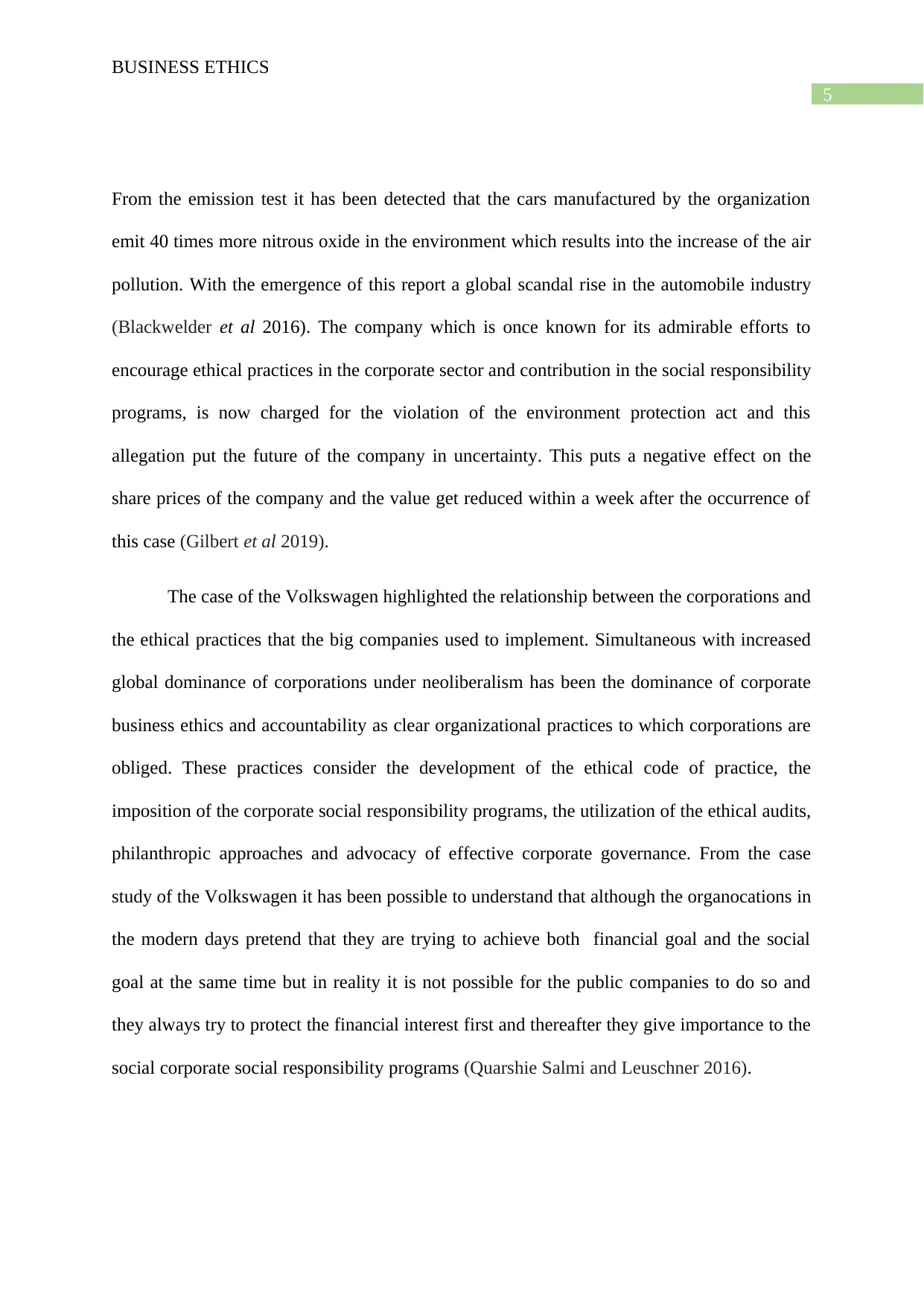
5
BUSINESS ETHICS
From the emission test it has been detected that the cars manufactured by the organization
emit 40 times more nitrous oxide in the environment which results into the increase of the air
pollution. With the emergence of this report a global scandal rise in the automobile industry
(Blackwelder et al 2016). The company which is once known for its admirable efforts to
encourage ethical practices in the corporate sector and contribution in the social responsibility
programs, is now charged for the violation of the environment protection act and this
allegation put the future of the company in uncertainty. This puts a negative effect on the
share prices of the company and the value get reduced within a week after the occurrence of
this case (Gilbert et al 2019).
The case of the Volkswagen highlighted the relationship between the corporations and
the ethical practices that the big companies used to implement. Simultaneous with increased
global dominance of corporations under neoliberalism has been the dominance of corporate
business ethics and accountability as clear organizational practices to which corporations are
obliged. These practices consider the development of the ethical code of practice, the
imposition of the corporate social responsibility programs, the utilization of the ethical audits,
philanthropic approaches and advocacy of effective corporate governance. From the case
study of the Volkswagen it has been possible to understand that although the organocations in
the modern days pretend that they are trying to achieve both financial goal and the social
goal at the same time but in reality it is not possible for the public companies to do so and
they always try to protect the financial interest first and thereafter they give importance to the
social corporate social responsibility programs (Quarshie Salmi and Leuschner 2016).
BUSINESS ETHICS
From the emission test it has been detected that the cars manufactured by the organization
emit 40 times more nitrous oxide in the environment which results into the increase of the air
pollution. With the emergence of this report a global scandal rise in the automobile industry
(Blackwelder et al 2016). The company which is once known for its admirable efforts to
encourage ethical practices in the corporate sector and contribution in the social responsibility
programs, is now charged for the violation of the environment protection act and this
allegation put the future of the company in uncertainty. This puts a negative effect on the
share prices of the company and the value get reduced within a week after the occurrence of
this case (Gilbert et al 2019).
The case of the Volkswagen highlighted the relationship between the corporations and
the ethical practices that the big companies used to implement. Simultaneous with increased
global dominance of corporations under neoliberalism has been the dominance of corporate
business ethics and accountability as clear organizational practices to which corporations are
obliged. These practices consider the development of the ethical code of practice, the
imposition of the corporate social responsibility programs, the utilization of the ethical audits,
philanthropic approaches and advocacy of effective corporate governance. From the case
study of the Volkswagen it has been possible to understand that although the organocations in
the modern days pretend that they are trying to achieve both financial goal and the social
goal at the same time but in reality it is not possible for the public companies to do so and
they always try to protect the financial interest first and thereafter they give importance to the
social corporate social responsibility programs (Quarshie Salmi and Leuschner 2016).
⊘ This is a preview!⊘
Do you want full access?
Subscribe today to unlock all pages.

Trusted by 1+ million students worldwide
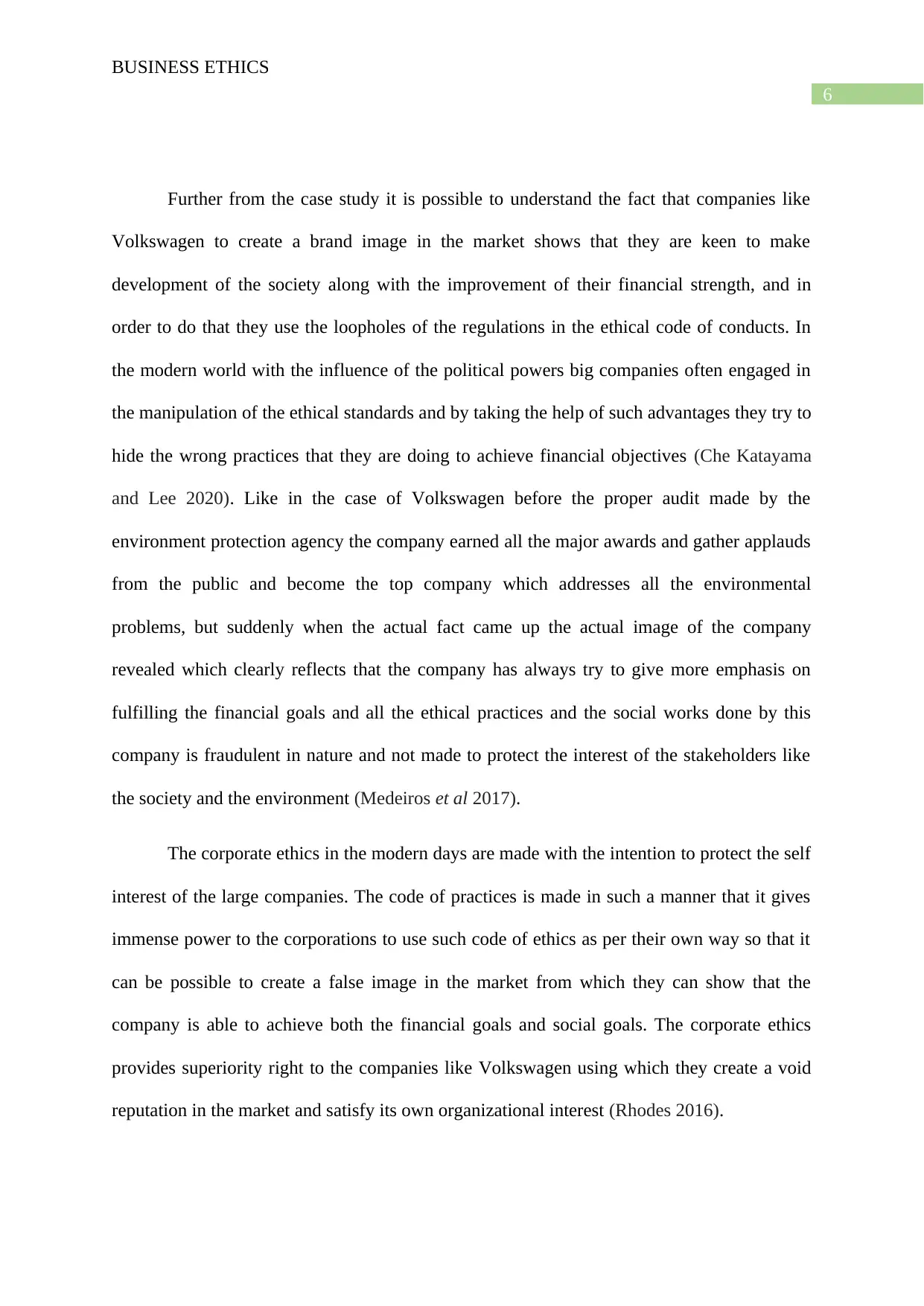
6
BUSINESS ETHICS
Further from the case study it is possible to understand the fact that companies like
Volkswagen to create a brand image in the market shows that they are keen to make
development of the society along with the improvement of their financial strength, and in
order to do that they use the loopholes of the regulations in the ethical code of conducts. In
the modern world with the influence of the political powers big companies often engaged in
the manipulation of the ethical standards and by taking the help of such advantages they try to
hide the wrong practices that they are doing to achieve financial objectives (Che Katayama
and Lee 2020). Like in the case of Volkswagen before the proper audit made by the
environment protection agency the company earned all the major awards and gather applauds
from the public and become the top company which addresses all the environmental
problems, but suddenly when the actual fact came up the actual image of the company
revealed which clearly reflects that the company has always try to give more emphasis on
fulfilling the financial goals and all the ethical practices and the social works done by this
company is fraudulent in nature and not made to protect the interest of the stakeholders like
the society and the environment (Medeiros et al 2017).
The corporate ethics in the modern days are made with the intention to protect the self
interest of the large companies. The code of practices is made in such a manner that it gives
immense power to the corporations to use such code of ethics as per their own way so that it
can be possible to create a false image in the market from which they can show that the
company is able to achieve both the financial goals and social goals. The corporate ethics
provides superiority right to the companies like Volkswagen using which they create a void
reputation in the market and satisfy its own organizational interest (Rhodes 2016).
BUSINESS ETHICS
Further from the case study it is possible to understand the fact that companies like
Volkswagen to create a brand image in the market shows that they are keen to make
development of the society along with the improvement of their financial strength, and in
order to do that they use the loopholes of the regulations in the ethical code of conducts. In
the modern world with the influence of the political powers big companies often engaged in
the manipulation of the ethical standards and by taking the help of such advantages they try to
hide the wrong practices that they are doing to achieve financial objectives (Che Katayama
and Lee 2020). Like in the case of Volkswagen before the proper audit made by the
environment protection agency the company earned all the major awards and gather applauds
from the public and become the top company which addresses all the environmental
problems, but suddenly when the actual fact came up the actual image of the company
revealed which clearly reflects that the company has always try to give more emphasis on
fulfilling the financial goals and all the ethical practices and the social works done by this
company is fraudulent in nature and not made to protect the interest of the stakeholders like
the society and the environment (Medeiros et al 2017).
The corporate ethics in the modern days are made with the intention to protect the self
interest of the large companies. The code of practices is made in such a manner that it gives
immense power to the corporations to use such code of ethics as per their own way so that it
can be possible to create a false image in the market from which they can show that the
company is able to achieve both the financial goals and social goals. The corporate ethics
provides superiority right to the companies like Volkswagen using which they create a void
reputation in the market and satisfy its own organizational interest (Rhodes 2016).
Paraphrase This Document
Need a fresh take? Get an instant paraphrase of this document with our AI Paraphraser
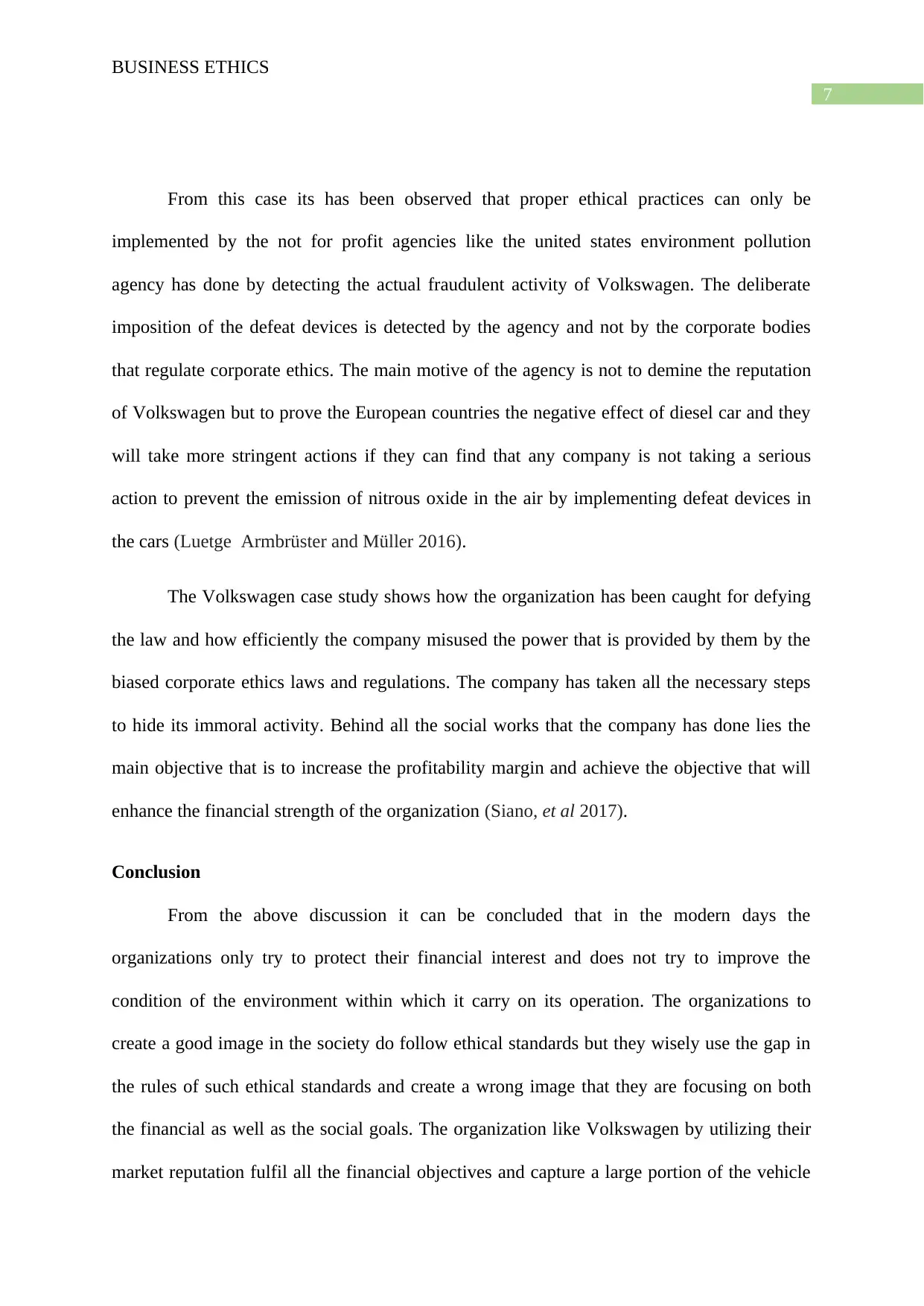
7
BUSINESS ETHICS
From this case its has been observed that proper ethical practices can only be
implemented by the not for profit agencies like the united states environment pollution
agency has done by detecting the actual fraudulent activity of Volkswagen. The deliberate
imposition of the defeat devices is detected by the agency and not by the corporate bodies
that regulate corporate ethics. The main motive of the agency is not to demine the reputation
of Volkswagen but to prove the European countries the negative effect of diesel car and they
will take more stringent actions if they can find that any company is not taking a serious
action to prevent the emission of nitrous oxide in the air by implementing defeat devices in
the cars (Luetge Armbrüster and Müller 2016).
The Volkswagen case study shows how the organization has been caught for defying
the law and how efficiently the company misused the power that is provided by them by the
biased corporate ethics laws and regulations. The company has taken all the necessary steps
to hide its immoral activity. Behind all the social works that the company has done lies the
main objective that is to increase the profitability margin and achieve the objective that will
enhance the financial strength of the organization (Siano, et al 2017).
Conclusion
From the above discussion it can be concluded that in the modern days the
organizations only try to protect their financial interest and does not try to improve the
condition of the environment within which it carry on its operation. The organizations to
create a good image in the society do follow ethical standards but they wisely use the gap in
the rules of such ethical standards and create a wrong image that they are focusing on both
the financial as well as the social goals. The organization like Volkswagen by utilizing their
market reputation fulfil all the financial objectives and capture a large portion of the vehicle
BUSINESS ETHICS
From this case its has been observed that proper ethical practices can only be
implemented by the not for profit agencies like the united states environment pollution
agency has done by detecting the actual fraudulent activity of Volkswagen. The deliberate
imposition of the defeat devices is detected by the agency and not by the corporate bodies
that regulate corporate ethics. The main motive of the agency is not to demine the reputation
of Volkswagen but to prove the European countries the negative effect of diesel car and they
will take more stringent actions if they can find that any company is not taking a serious
action to prevent the emission of nitrous oxide in the air by implementing defeat devices in
the cars (Luetge Armbrüster and Müller 2016).
The Volkswagen case study shows how the organization has been caught for defying
the law and how efficiently the company misused the power that is provided by them by the
biased corporate ethics laws and regulations. The company has taken all the necessary steps
to hide its immoral activity. Behind all the social works that the company has done lies the
main objective that is to increase the profitability margin and achieve the objective that will
enhance the financial strength of the organization (Siano, et al 2017).
Conclusion
From the above discussion it can be concluded that in the modern days the
organizations only try to protect their financial interest and does not try to improve the
condition of the environment within which it carry on its operation. The organizations to
create a good image in the society do follow ethical standards but they wisely use the gap in
the rules of such ethical standards and create a wrong image that they are focusing on both
the financial as well as the social goals. The organization like Volkswagen by utilizing their
market reputation fulfil all the financial objectives and capture a large portion of the vehicle
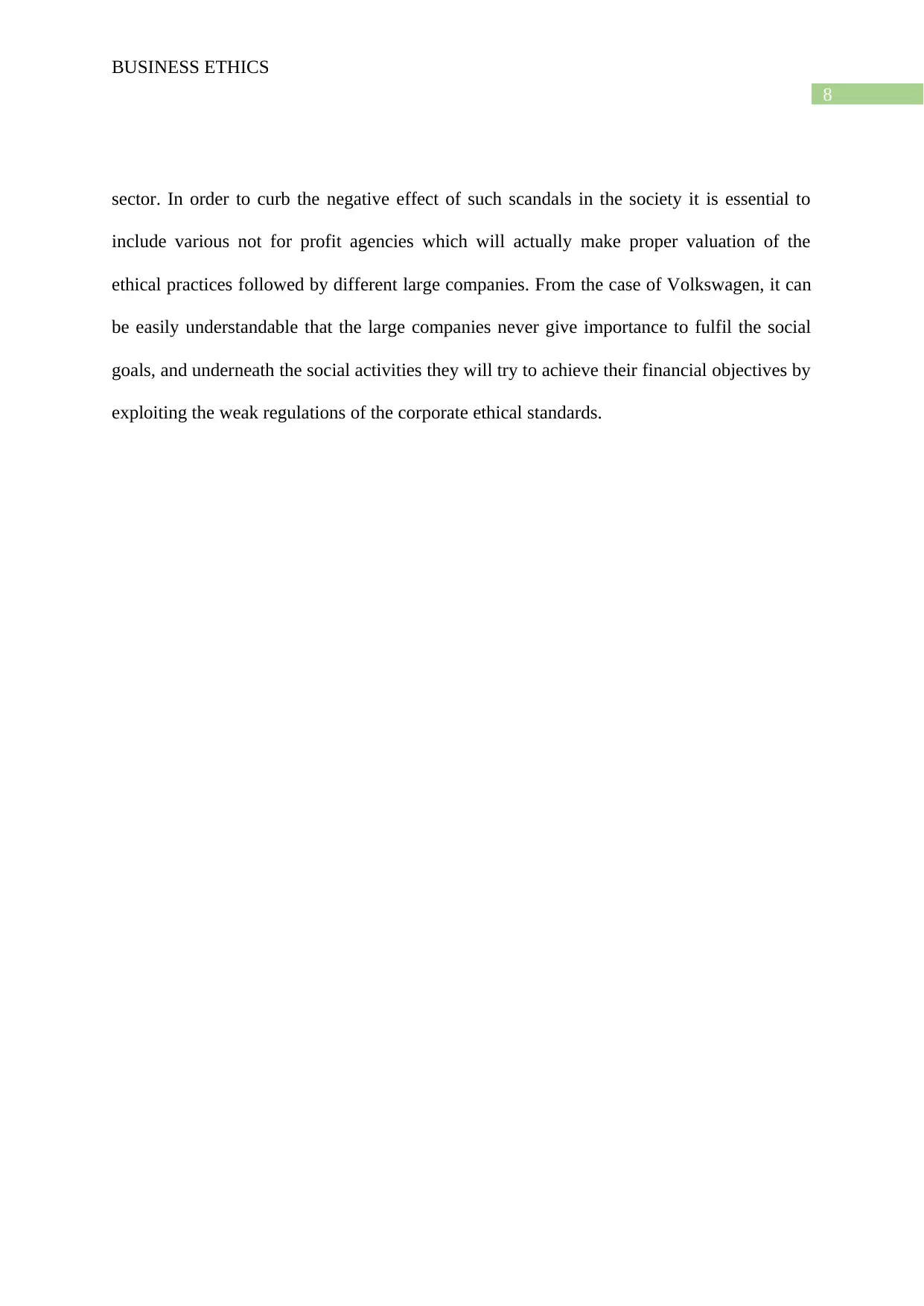
8
BUSINESS ETHICS
sector. In order to curb the negative effect of such scandals in the society it is essential to
include various not for profit agencies which will actually make proper valuation of the
ethical practices followed by different large companies. From the case of Volkswagen, it can
be easily understandable that the large companies never give importance to fulfil the social
goals, and underneath the social activities they will try to achieve their financial objectives by
exploiting the weak regulations of the corporate ethical standards.
BUSINESS ETHICS
sector. In order to curb the negative effect of such scandals in the society it is essential to
include various not for profit agencies which will actually make proper valuation of the
ethical practices followed by different large companies. From the case of Volkswagen, it can
be easily understandable that the large companies never give importance to fulfil the social
goals, and underneath the social activities they will try to achieve their financial objectives by
exploiting the weak regulations of the corporate ethical standards.
⊘ This is a preview!⊘
Do you want full access?
Subscribe today to unlock all pages.

Trusted by 1+ million students worldwide
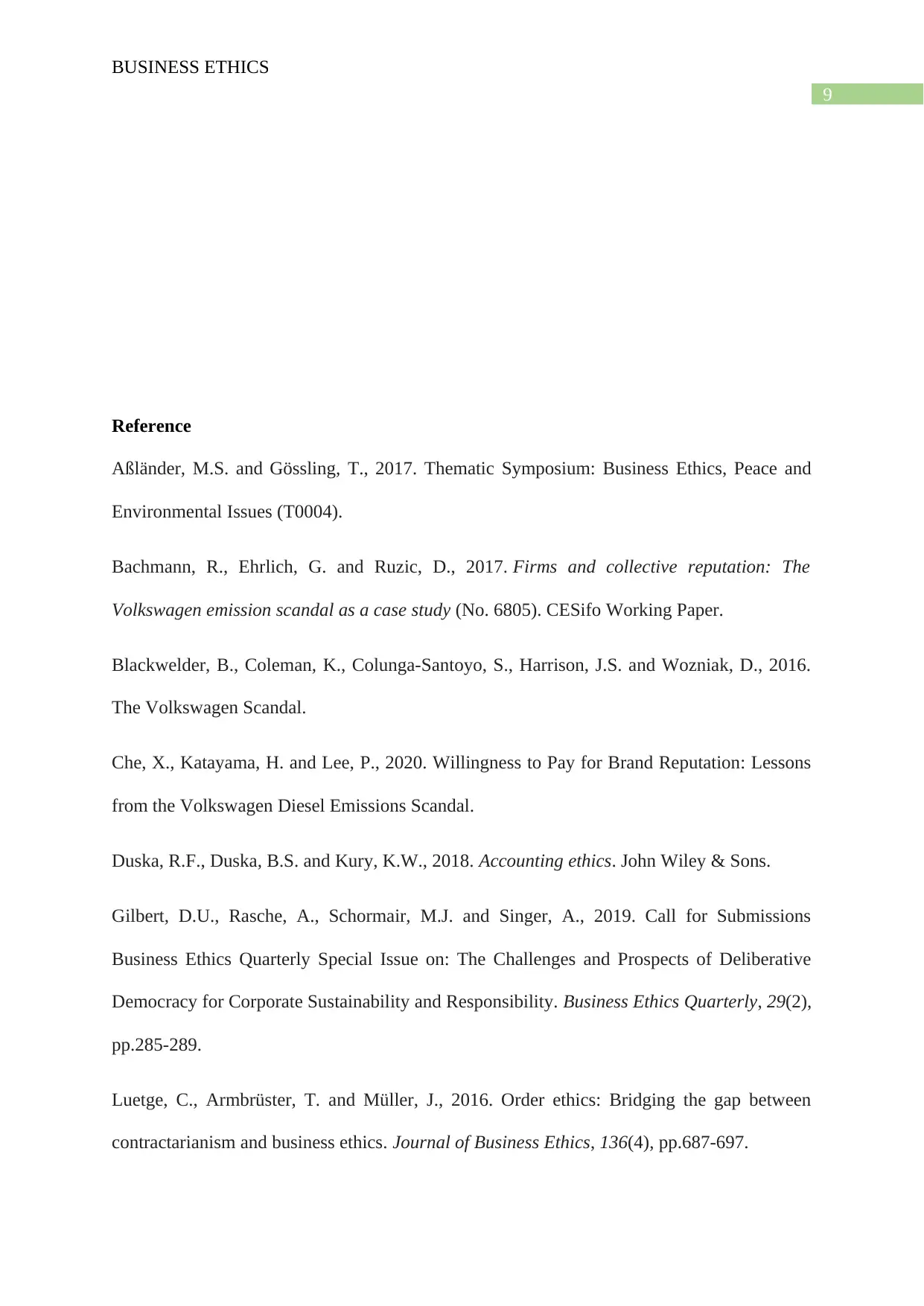
9
BUSINESS ETHICS
Reference
Aßländer, M.S. and Gössling, T., 2017. Thematic Symposium: Business Ethics, Peace and
Environmental Issues (T0004).
Bachmann, R., Ehrlich, G. and Ruzic, D., 2017. Firms and collective reputation: The
Volkswagen emission scandal as a case study (No. 6805). CESifo Working Paper.
Blackwelder, B., Coleman, K., Colunga-Santoyo, S., Harrison, J.S. and Wozniak, D., 2016.
The Volkswagen Scandal.
Che, X., Katayama, H. and Lee, P., 2020. Willingness to Pay for Brand Reputation: Lessons
from the Volkswagen Diesel Emissions Scandal.
Duska, R.F., Duska, B.S. and Kury, K.W., 2018. Accounting ethics. John Wiley & Sons.
Gilbert, D.U., Rasche, A., Schormair, M.J. and Singer, A., 2019. Call for Submissions
Business Ethics Quarterly Special Issue on: The Challenges and Prospects of Deliberative
Democracy for Corporate Sustainability and Responsibility. Business Ethics Quarterly, 29(2),
pp.285-289.
Luetge, C., Armbrüster, T. and Müller, J., 2016. Order ethics: Bridging the gap between
contractarianism and business ethics. Journal of Business Ethics, 136(4), pp.687-697.
BUSINESS ETHICS
Reference
Aßländer, M.S. and Gössling, T., 2017. Thematic Symposium: Business Ethics, Peace and
Environmental Issues (T0004).
Bachmann, R., Ehrlich, G. and Ruzic, D., 2017. Firms and collective reputation: The
Volkswagen emission scandal as a case study (No. 6805). CESifo Working Paper.
Blackwelder, B., Coleman, K., Colunga-Santoyo, S., Harrison, J.S. and Wozniak, D., 2016.
The Volkswagen Scandal.
Che, X., Katayama, H. and Lee, P., 2020. Willingness to Pay for Brand Reputation: Lessons
from the Volkswagen Diesel Emissions Scandal.
Duska, R.F., Duska, B.S. and Kury, K.W., 2018. Accounting ethics. John Wiley & Sons.
Gilbert, D.U., Rasche, A., Schormair, M.J. and Singer, A., 2019. Call for Submissions
Business Ethics Quarterly Special Issue on: The Challenges and Prospects of Deliberative
Democracy for Corporate Sustainability and Responsibility. Business Ethics Quarterly, 29(2),
pp.285-289.
Luetge, C., Armbrüster, T. and Müller, J., 2016. Order ethics: Bridging the gap between
contractarianism and business ethics. Journal of Business Ethics, 136(4), pp.687-697.
Paraphrase This Document
Need a fresh take? Get an instant paraphrase of this document with our AI Paraphraser
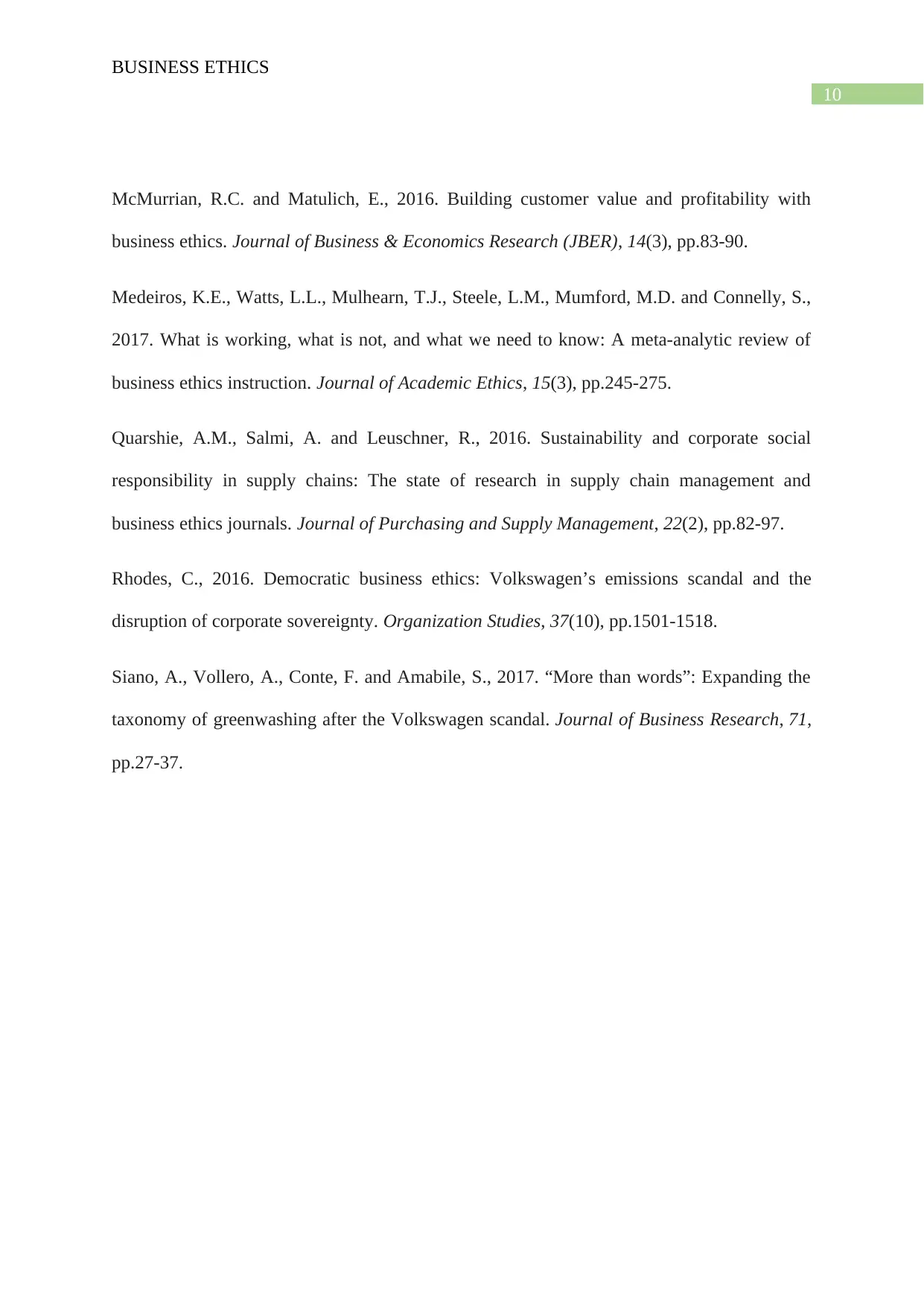
10
BUSINESS ETHICS
McMurrian, R.C. and Matulich, E., 2016. Building customer value and profitability with
business ethics. Journal of Business & Economics Research (JBER), 14(3), pp.83-90.
Medeiros, K.E., Watts, L.L., Mulhearn, T.J., Steele, L.M., Mumford, M.D. and Connelly, S.,
2017. What is working, what is not, and what we need to know: A meta-analytic review of
business ethics instruction. Journal of Academic Ethics, 15(3), pp.245-275.
Quarshie, A.M., Salmi, A. and Leuschner, R., 2016. Sustainability and corporate social
responsibility in supply chains: The state of research in supply chain management and
business ethics journals. Journal of Purchasing and Supply Management, 22(2), pp.82-97.
Rhodes, C., 2016. Democratic business ethics: Volkswagen’s emissions scandal and the
disruption of corporate sovereignty. Organization Studies, 37(10), pp.1501-1518.
Siano, A., Vollero, A., Conte, F. and Amabile, S., 2017. “More than words”: Expanding the
taxonomy of greenwashing after the Volkswagen scandal. Journal of Business Research, 71,
pp.27-37.
BUSINESS ETHICS
McMurrian, R.C. and Matulich, E., 2016. Building customer value and profitability with
business ethics. Journal of Business & Economics Research (JBER), 14(3), pp.83-90.
Medeiros, K.E., Watts, L.L., Mulhearn, T.J., Steele, L.M., Mumford, M.D. and Connelly, S.,
2017. What is working, what is not, and what we need to know: A meta-analytic review of
business ethics instruction. Journal of Academic Ethics, 15(3), pp.245-275.
Quarshie, A.M., Salmi, A. and Leuschner, R., 2016. Sustainability and corporate social
responsibility in supply chains: The state of research in supply chain management and
business ethics journals. Journal of Purchasing and Supply Management, 22(2), pp.82-97.
Rhodes, C., 2016. Democratic business ethics: Volkswagen’s emissions scandal and the
disruption of corporate sovereignty. Organization Studies, 37(10), pp.1501-1518.
Siano, A., Vollero, A., Conte, F. and Amabile, S., 2017. “More than words”: Expanding the
taxonomy of greenwashing after the Volkswagen scandal. Journal of Business Research, 71,
pp.27-37.

11
BUSINESS ETHICS
BUSINESS ETHICS
⊘ This is a preview!⊘
Do you want full access?
Subscribe today to unlock all pages.

Trusted by 1+ million students worldwide
1 out of 14
Related Documents
Your All-in-One AI-Powered Toolkit for Academic Success.
+13062052269
info@desklib.com
Available 24*7 on WhatsApp / Email
![[object Object]](/_next/static/media/star-bottom.7253800d.svg)
Unlock your academic potential
Copyright © 2020–2025 A2Z Services. All Rights Reserved. Developed and managed by ZUCOL.





